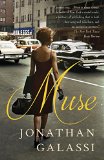Summary | Excerpt | Reading Guide | Reviews | Beyond the Book | Readalikes | Genres & Themes | Author Bio

Critics' Opinion:
Readers' Opinion:
First Published:
Jun 2015, 272 pages
Paperback:
Jun 2016, 272 pages
 Book Reviewed by:
Book Reviewed by:
Darcie R.J. Abbene
Buy This Book
viii
The Fair
The modern-day Frankfurt Book Fair was a postwar phenomenon, a vehicle for easing the readmission of Germany into the company of civilized Western societies. Originally, it had been a phenomenon of the Renaissance, Frankfurt being the largest trading center near Mainz, where Johannes Gutenberg and his fellows had invented movable type in the late 1430s. The fair had been established again in 1949 and had grown into the most important annual gathering in international publishing. Every October, tens of thousands of publishers from all over the world scurried like so many ants among the warehouse-like halls of the fair's bleak cam- pus on the edge of the city center, rushing to appointments with their counterparts.
But books weren't sold at the modern-day Frankfurt. Authors were—by the pound and sometimes by the gross. What the publishers did at Frankfurt was hump the right to sell their writers' work in other territories and languages, often pocketing a substantial portion of the earnings for themselves (the ever-paternalistic French were among the most egregious, raking off 50 percent of the take). The days before agents woke up to the potential of international deals were a wild and woolly era, though the seigneurial rituals of fair commerce were punctiliously observed by the players. Rights directors were the most visible players under the Frankfurt bell jar, and the acknowledged queen of them all was Cora Blamesly, FSG's mace-wielding Iron Maiden, who hailed from the arbor-draped hills of Carinthia and was a past master at brandishing her picked-up Sloane Ranger accent, with its ineradicable Germanic undertone, and her S/M selling techniques to extract outrageous con- tracts from her desperate European "friends."
Cora and her ilk would hold back important manuscripts for sale at the fair and then "slip" them with elaborate fanfare to favored editors in various territories, demanding that they be read overnight and soliciting preemptive offers, often inflated by the expectations and tensions of Frankfurt's carnival atmosphere.
The Europeans were desperate because the postwar cultural economy had dictated that Italian and German, Japanese and Brazilian, and sometimes even French readers needed and wanted to read American books. Not just the big commercial authors, either, the Stephen Kings and Danielle Steels, but the Serious Literary Writers, too. First there'd been the anxiety-ridden, attitude-infused Jewish American novelists; followed by the less interesting, more self-regarding WASPs, the Updikes and Styrons and Foxxes; and the nondescript newbies, the young Turks full of sass and plausibility that Cora and her counterparts whipped up into supernovas for the four days of the fair, sometimes for book after book, year after year. European publishing nabobs like Jorge Vilas (Spain), Norberto Beltraffio (Italy), Matthias Schoenborn (Germany), and the biggest overspender of them all, Danny van Gennep from Utrecht, had been playing this way for years, and were on the hook to Cora for literal millions. When Roger Straus or Lucy Morello brought a new author to Frankfurt, they all jumped, as they did for Rob Routman, the head-turning editor in chief of Owl House—sometimes, it was rumored, without reading all that much (or, let's be honest, any) of the manuscript—because often, or often enough anyway, the books "worked," i.e., sold copies back home. Many publishers played "Ready, Fire, Aim" buying foreign books, acquiring titles that sounded hot but often, when the com- missioned translations materialized months later, would have them shaking their heads, wondering how such a dog could have appeared so leonine in the half-light of the smoke-infested Hessischer Hof bar, still packed at two a.m. with drunken, libidinous editors and rights people splayed across each other on the sagging couches.
The serial drink dates and langweilisch alcoholic dinners with self-congratulatory speeches by the hosting German publishers, followed by more drinks on into the night (same-time-next-year cohabitation was not unheard of, either) contributed to Frankfurt's nonstop bonhomie and its open-walleted frenzy. As one grand old man of Danish publishing had told Homer, "We come to Frankfurt every year to see if we're still alive." Some, alas, were not. The worst were former bigwigs who had the bad taste to reap- pear, wandering the cavernous halls, buttonholing former colleagues between nonexistent appointments. They were ghosts, revenants, and everyone knew it—including them, perhaps.
Excerpted from Muse by Jonathan Galassi. Copyright © 2015 by Jonathan Galassi. Excerpted by permission of Knopf. All rights reserved. No part of this excerpt may be reproduced or reprinted without permission in writing from the publisher.





The Flower Sisters
by Michelle Collins Anderson
From the new Fannie Flagg of the Ozarks, a richly-woven story of family, forgiveness, and reinvention.

The House on Biscayne Bay
by Chanel Cleeton
As death stalks a gothic mansion in Miami, the lives of two women intertwine as the past and present collide.

The Funeral Cryer by Wenyan Lu
Debut novelist Wenyan Lu brings us this witty yet profound story about one woman's midlife reawakening in contemporary rural China.
Your guide toexceptional books
BookBrowse seeks out and recommends the best in contemporary fiction and nonfiction—books that not only engage and entertain but also deepen our understanding of ourselves and the world around us.